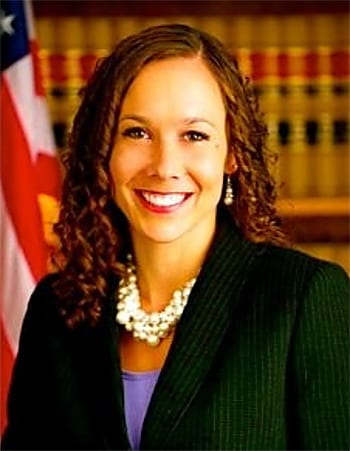By Andrew Cohen

Grayce Zelphin ’11 freely admits that returning to Berkeley Law wasn’t on her radar. But when she heard about its new director of judicial clerkships position, the chance to merge two passions—mentoring and diversifying the legal profession—proved too enticing to bypass.
The law school has reached new clerkship heights lately, placing more students and funneling a large number of ethnic minority and public interest-focused applicants into judicial chambers. There are currently 95 Berkeley Law graduates clerking in 29 states and territories. Three of them secured coveted clerkships at the U.S. Supreme Court—a single-term school record.
Eager to expand that success, Zelphin connects with clerkship-minded students and alumni on many levels—including as a Berkeley Law graduate, former federal district court and federal appeals court clerk, and person of color. She also brings law-firm experience, having litigated at Boies Schiller Flexner and at Skadden, Arps, Slate, Meagher & Flom.
Zelphin recently discussed her new position and the push to extend Berkeley Law’s clerkship reach.
Q: What sparked your interest in this job?
A: I enjoy practicing law and adore working through complex legal issues, so this position wasn’t initially on my radar. My interest was based on many factors—my love for clerking, my enjoyment of mentoring, and my desire to see a more diverse clerkship application pool were the biggest draws. After I clerked, I was always looking for ways to help students and young lawyers, particularly those from traditionally underrepresented backgrounds, pursue and obtain the truly remarkable experience of clerking. This position, at this incredible institution, provides an opportunity to do just that.
Q: What’s it like working where you went to law school?
A: A bit surreal, but it reminds me how fortunate I was to be a student here, and how important my Berkeley Law connections remain to this day.
Q: The school’s clerkship numbers are soaring. How different are the resources available to students considering clerkships now compared to when you went to school here?
A: They’ve improved and grown tremendously, in large part driven by Eric Stern (deputy director of the Career Development Office), faculty, and alumni who have championed Berkeley Law applicants and made invaluable connections on behalf of students considering clerkships. The market has also changed dramatically since I was a student. Many more students apply for clerkships after graduation, and many more judges prefer to hire clerks with post-graduate experience. Berkeley Law has done a much better job of being supportive of alumni applying in this trend.
Q: What does your day-to-day work entail?
A: The main functions include counseling and mentoring students and alumni who are interested in clerking and providing resources to aid in their success; creating programs and managing events that will expose students to clerkship opportunities; building and strengthening Berkeley Law’s relationships with the bench; and innovating and growing our judicial clerkship program. As this is a new position, one of the greatest benefits is getting to innovate and define the role.
Q: How beneficial is your own clerkship experience in terms of knowing what judges look for on applications and in the work itself?
A: Being a former clerk and having been a part of the clerk-hiring process from the inside guides my ability to advise students and alumni. I understand what the work is and I can offer insight into why an applicant may want to pursue a certain type of clerkship as opposed to another—not all clerkships are the same work. I also feel like I have perspective of what judges are looking for, and I routinely use this insight to impart advice to clerkship applicants.
Q: Berkeley Law has made significant progress in placing public interest-oriented and students of color in clerkships around the country. How vital is it to continue that momentum?
A: It is crucial. Berkeley Law has made inroads in this area, but the work is far from complete. The lack of diversity in law clerk positions remains stark, and as an institution we can do more. This issue is central to why I took this new role. While there have been too few law clerks of color, I think it’s also important to highlight that many law clerks of color have gone on to do incredible things to shape diversity in the legal profession. For example, my Seventh Circuit judge, Ann Claire Williams, was one of the first Black law clerks on that court in 1975.
Q: What was the most meaningful part of your own law school experience?
A: There were so many. The Women of Color Collective, the Berkeley Journal of African-American Law & Policy, and doing a field placement with the NAACP Legal Defense and Educational Fund were all highlights. But by far the most impactful part was the relationships that I gained. I met many of my dearest friends and mentors while I was in law school.
Q: What advice would you give yourself 10 years ago, when you were a student here?
A: To remember that law school is a tiny piece of a long career. It’s easy to get wrapped up in the competitiveness and to compare yourself, especially with imposter syndrome, to other law students. But in a few years, you and your classmates will all move on to do different things and the blip of time that is law school will seem so much smaller. Law school goes fast and for many it’s the last time we get to be a student. Enjoy it!